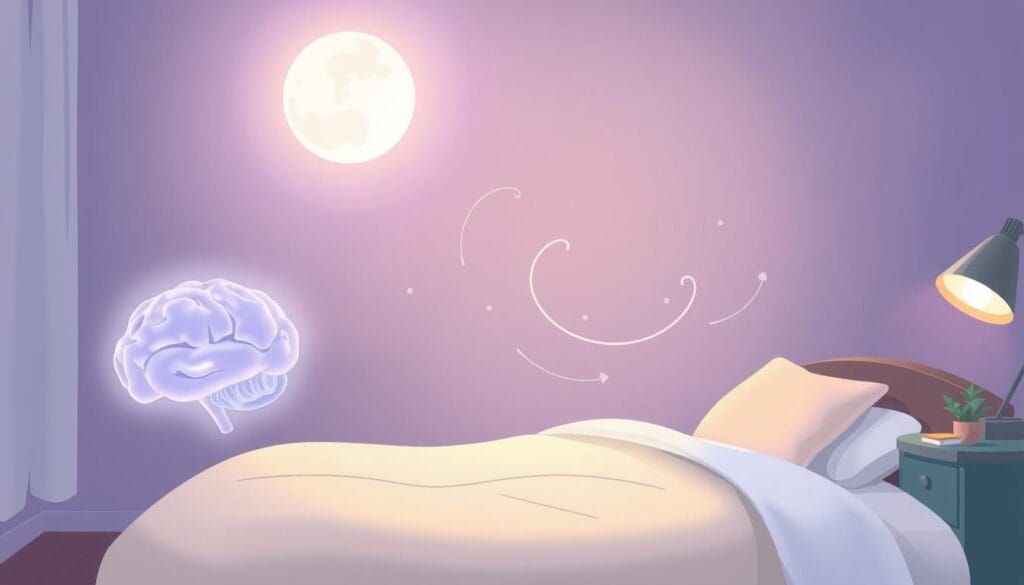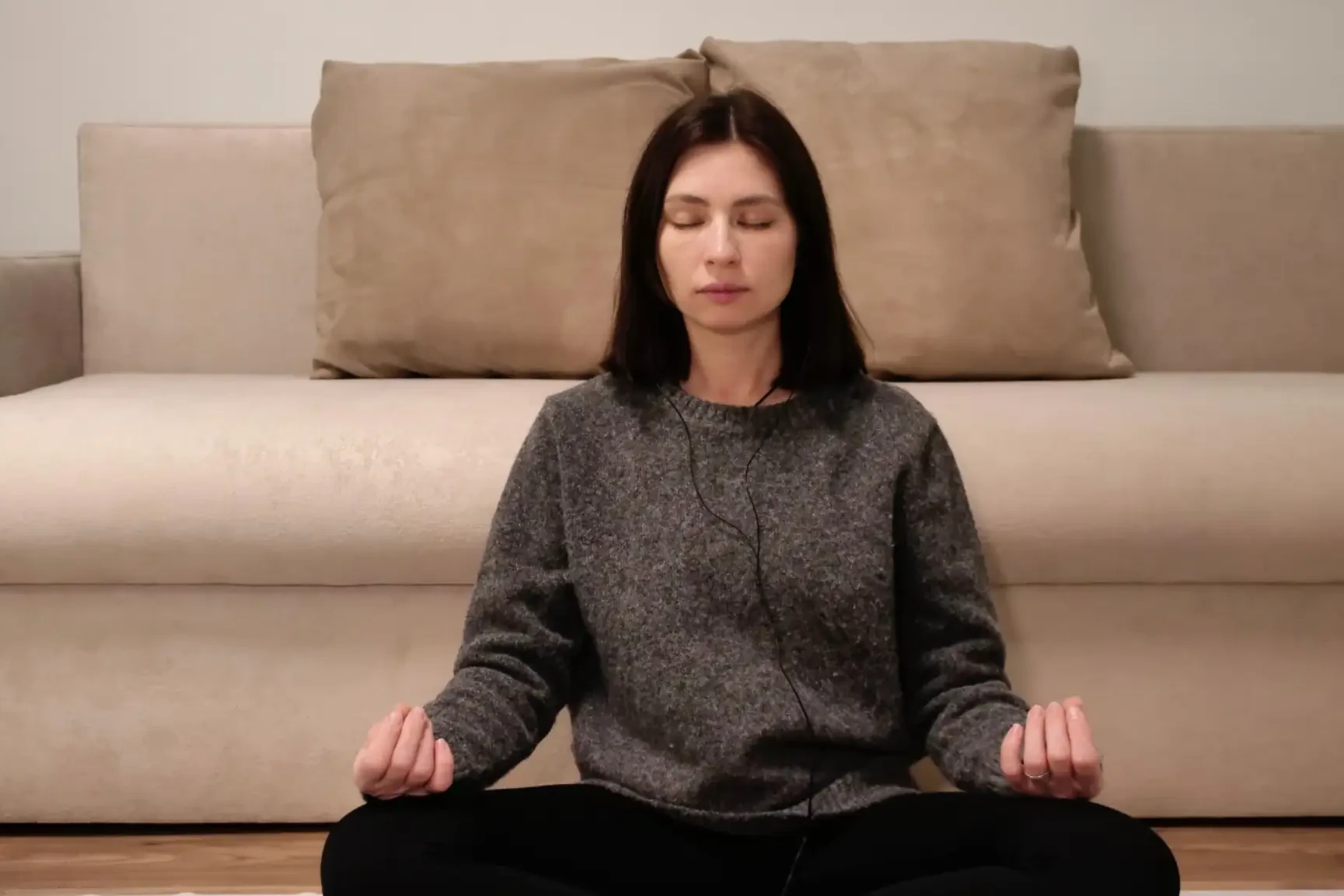Sleep is key for our survival. For years, we’ve focused on how much we sleep. But now, we see how good our sleep is just as important.
Studies show we sleep less now than before. But, some countries’ sleep times haven’t changed much since 2004. This shows we might be getting used to less sleep.
A big study in 1989 found sleep problems can lead to mental health issues. This shows how sleep quality affects our health. Now, we think sleep quality is more important than how long we sleep.
We’re learning more about why good sleep is so important. Just sleeping a lot doesn’t mean you’re getting quality rest. The real value of sleep comes from how well it makes us feel refreshed and ready for the day.
Table of Contents
ToggleUnderstanding Sleep Quality
Sleep quality is key to good health. It’s not just about how long you sleep. It also includes how well you sleep.
Good sleep quality means falling asleep fast, sleeping all night, and feeling refreshed in the morning. It’s about being satisfied with your sleep.
What Is Sleep Quality?
Good sleep quality means falling asleep in 30 minutes. You should sleep all night without waking. You should spend more time sleeping than trying to sleep.
Getting 7-9 hours of sleep is important. Your sleep should match your natural rhythm. You should feel rested and satisfied with your sleep.
Factors Influencing Sleep Quality
Many things can affect your sleep quality. These include your age, culture, screen time, and stress. Knowing these factors helps improve your sleep.
Researchers found four key elements for sleep quality. These are Sleep Latency, Awakenings, Wake After Sleep Onset, and Sleep Efficiency. They studied 277 research studies on sleep quality.
Doctors use patient answers and sleep tests to check sleep quality. Tests like polysomnography (PSG) help diagnose sleep disorders. They give insights into sleep quality.
Knowing about sleep quality and its factors is important. It helps improve sleep health and well-being. By focusing on sleep cycles and quality, you can enhance your sleep and enjoy its benefits.
The Impact of Poor Sleep Quality
Good sleep is key for health and happiness. But, many people don’t get enough quality sleep. This affects their body and mind a lot.
Effects on Physical Health
Poor sleep can harm your body. It makes you tired, weakens your immune system, and can mess with your skin. It also stresses your heart and can make you gain weight.
Effects on Mental Health
Poor sleep also hurts your mind. It makes you feel tired, moody, and hard to control your feelings. This can make things worse, creating a bad cycle.
Long-term Consequences
Long-term, poor sleep is very bad. It can lead to serious diseases like diabetes, high blood pressure, and heart disease. It can even cause depression and Alzheimer’s.

It’s important to know how bad poor sleep is. By understanding the risks, we can work on getting better sleep. This helps us stay healthy and happy.
Sleep Quantity vs. Sleep Quality
Getting enough sleep is important, but it’s not just about how long you sleep. The quality of your sleep matters a lot too. Adults need 7-9 hours of sleep each night.
Defining Sleep Quantity
Sleep quantity is how many hours you sleep each night. The CDC says over a third of American adults don’t get enough sleep. Experts say adults need 7-9 hours, with women needing more because of sleep disorders.
How Quality Trumps Quantity
Sleep quality is more important than how long you sleep. It includes sleep stages, alertness, and how well you sleep. Even if you sleep long enough, bad sleep quality can harm you.
Good sleep habits are key for health. Keep a regular sleep schedule, avoid screens before bed, and make your sleep space comfy. This helps you sleep well every night.
Benefits of High-Quality Sleep
Getting good sleep is key for both mind and body. It boosts your thinking skills, mood, and physical strength. These are just a few perks of sleeping well.
Enhanced Cognitive Function
Quality sleep is vital for your brain. It makes you more focused, sharp, and able to remember things better. People who sleep well do better at tasks that need quick thinking and solving problems.
Not sleeping enough can hurt your brain power. It can make you less productive.
Improved Mood and Emotional Well-being
Sleep affects how you feel. Good sleep makes you happier and helps you handle stress better. Bad sleep can lead to feeling anxious or depressed.
Better Physical Performance
Good sleep is also good for your body. It keeps your immune system strong, your skin healthy, and your heart in good shape. It also helps control hunger and keeps your metabolism balanced.
For athletes, it’s crucial for recovery and improving their game.
Quality sleep has many benefits. It improves your thinking, mood, and physical health. By valuing sleep, you can reach your full health potential.

How to Measure Sleep Quality
Getting good sleep is key for our health. Many find it hard to measure their sleep quality. Sleep quality is as important as how much we sleep.
There are tools and devices to help understand and improve sleep quality. They give us valuable insights.
Tools and Devices for Tracking
Measuring sleep quality can be done in two ways. We can rate how we feel after waking up. Or, we can use devices and sleep studies for a detailed look.
- Sleep tracking devices, like fitness trackers and smartwatches, track sleep stages and efficiency. They help find ways to get better sleep.
- Polysomnography, done in a sleep lab, analyzes sleep patterns. It looks at brain waves, eye movements, and breathing. It gives a full picture of sleep quality.
Understanding Sleep Cycles
Knowing your sleep cycles is key to measuring sleep quality. We go through four sleep stages each night. Each stage helps our body and mind rest.
Using sleep tracking devices or getting a professional check can help. It gives us the info to make changes for better health.
Common Sleep Disorders
Sleep disorders can really hurt how well you sleep and your health. Insomnia is a big one, making it hard to fall or stay asleep. It can make you tired during the day, change your mood, and hurt your thinking skills.
Sleep apnea is another big problem. It makes you stop breathing a lot during sleep. This breaks up your sleep and can hurt your heart.
Insomnia and Its Effects
Insomnia is very common, with over 80 types. Most adults need 7-8 hours of sleep each night. But insomnia can mess with this.
Things like caffeine, alcohol, and weird work hours can cause insomnia. It can make you tired, hard to focus, and change your mood. It also raises the chance of accidents.
Sleep Apnea Explained
Sleep apnea is a big sleep problem. It happens when your airway blocks during sleep, stopping and starting your breathing. Loud snoring, feeling very tired during the day, and heart problems are signs.
To find out if you have sleep apnea, you might need a sleep study. Doctors might suggest a CPAP machine to keep your airway open.
Other Disorders Impacting Sleep Quality
- Restless Leg Syndrome (RLS): A neurological condition that makes you want to move your legs a lot, disrupting sleep.
- Narcolepsy: A sleep disorder that makes you very sleepy during the day and can make you fall asleep suddenly.
- Circadian Rhythm Disorders: Problems with your body’s clock, making it hard to sleep and wake up at the right times.
These and other sleep disorders can really mess with your sleep. They can lead to health problems. Getting help and finding ways to improve your sleep is key for feeling better.

Strategies for Improving Sleep Quality
Improving sleep quality takes many steps. You can start by making your sleep space better. Also, having a regular sleep schedule and healthy habits help a lot. These steps can make you sleep better and feel great.
Optimizing Your Sleep Environment
A comfy sleep space is key. You need a good mattress and dark curtains. Keep your room cool, around 65°F to 70°F. Also, less noise helps you sleep better.
Establishing a Sleep Routine
Being consistent is important. Go to bed and wake up at the same time every day. This helps your body get into a rhythm. Try not to nap too much during the day.
Lifestyle Changes to Enhance Sleep
Changing your lifestyle can also help. Cut down on caffeine, especially in the evening. Exercise is good, but not right before bed. Also, avoid screens before bed to avoid blue light.
Using these tips can really help. Improve your sleep space, stick to a routine, and live healthier. You’ll sleep better and feel better too.
Learn more about the importance of sleep quality in brain health
The Role of Nutrition and Exercise
Good nutrition and regular exercise are key for quality sleep. Some foods help sleep better, and exercise improves sleep quality. Knowing how nutrition, exercise, and sleep connect helps improve health and well-being.
Foods That Promote Better Sleep
Foods with tryptophan, magnesium, and melatonin aid sleep. Milk, bananas, nuts, and cherries are good for sleep. Eating light before bed and avoiding caffeine and alcohol also helps sleep.
Impact of Physical Activity on Sleep Quality
- Regular exercise boosts sleep quality by helping you fall asleep faster and sleep deeper.
- Adults who exercise for 30 minutes a day sleep 15 minutes longer than non-exercisers.
- Moderate exercise, like brisk walking or swimming, helps those with insomnia sleep better.
But, intense exercise before bed can keep you awake. So, when you exercise matters for good sleep.

Adding a balanced diet and exercise to your day improves sleep and health. It’s a step towards better sleep and overall well-being.
Mindfulness and Sleep
Getting good sleep is key for feeling well in body and mind. Mindfulness helps a lot with this. Meditation, a big part of mindfulness, makes sleep better and cuts down on insomnia.
Benefits of Meditation for Sleep
Mindfulness meditation can really help with insomnia and make sleep better. It relaxes you, lowers stress and anxiety. This makes it easier to fall asleep and sleep better.
It also makes sleep more efficient, longer, and less disturbed. This is great for getting a good night’s rest.
Techniques for Relaxation Before Bed
- Deep Breathing Exercises: Slow, deep breathing calms you down before bed.
- Progressive Muscle Relaxation: Tensing and releasing muscles helps release tension.
- Guided Imagery: Imagining calm scenes helps quiet your mind for sleep.
Adding these mindfulness techniques to your bedtime routine can greatly improve your sleep. It makes for a more restful and refreshing night.
Importance of Sleep Hygiene
Sleep hygiene is about the habits that help you sleep well. It’s key for quality sleep and health. Knowing about sleep hygiene and following certain practices can greatly improve your sleep.
Defining Sleep Hygiene
Sleep hygiene includes habits and environment that affect sleep quality. It’s about having a regular sleep schedule and a cozy sleep space. Good sleep hygiene leads to better sleep and health.
Practices to Maintain Good Sleep Hygiene
Good sleep hygiene means following certain practices. These help you sleep well and feel refreshed. Here are some:
- Go to bed and wake up at the same time every day.
- Have a calming routine before bed, like reading or a warm bath.
- Make sure your bedroom is cool, dark, and quiet.
- Don’t use phones or computers before bed.
- Don’t drink caffeine, nicotine, or alcohol close to bedtime.
- Exercise during the day but not before bed.
- Use relaxation techniques like deep breathing to manage stress.
By following these good sleep habits, you can sleep better. This improves your thinking, health, and overall happiness.
Seeking Professional Help
Many sleep problems can be fixed with lifestyle changes and better sleep habits. But, some cases need a doctor’s help. If you often can’t sleep well or feel tired during the day, see a sleep specialist.
Snoring a lot, gasping while sleeping, or feeling very tired during the day also means you might need a doctor. These signs can show serious sleep problems.
Treatment Options for Sleep Issues
There are many ways to treat sleep problems. Cognitive behavioral therapy for insomnia (CBT-I) is one. Sleep specialists can create plans to help with sleep quality issues.
People with depression or anxiety might find CBT-I helpful. It can really improve their symptoms.
Seeing a sleep specialist is key if you have ongoing or serious sleep issues. They can find the cause of your sleep problems. Then, they can help you get better sleep and feel better overall.
FAQ
What is the importance of sleep quality?
Sleep quality is more important than how long you sleep. Good sleep quality lets your body go through all needed sleep stages. This helps your body and mind get fully rested.
What factors influence sleep quality?
Many things can affect how well you sleep. These include your age, culture, screen time, and stress. Making your sleep space better and sticking to a sleep schedule can help.
What are the effects of poor sleep quality?
Bad sleep quality can harm your health. It can make you tired, weaken your immune system, and affect your skin. It can also lead to heart problems, depression, and memory loss.
How does sleep quality differ from sleep quantity?
Sleep quantity is how long you sleep each night. Sleep quality is about how well you sleep. It includes how easy it is to fall asleep and how refreshed you feel in the morning.
What are the benefits of high-quality sleep?
Good sleep is great for your mind and body. It boosts your thinking skills, mood, and immune system. It also makes your skin better and helps your heart stay healthy.
How can sleep quality be measured?
There are ways to check how well you sleep. You can tell how you feel in the morning. Or, you can use devices to track your sleep stages and how well you sleep.
What are common sleep disorders that impact sleep quality?
Sleep disorders like insomnia and sleep apnea can hurt your sleep quality. They can make it hard to sleep well and lead to health problems.
How can sleep quality be improved?
To sleep better, make your sleep space comfy. Stick to a sleep schedule and avoid caffeine and alcohol. Mindfulness practices like meditation can also help.
When should someone seek professional help for sleep issues?
If you often can’t sleep or feel tired all day, see a sleep specialist. They can help you find ways to sleep better and feel more rested.
About The Author

Medically reviewed by Dr. Chandril Chugh, MD, DM (Neurology)
Dr. Chandril Chugh is a U.S.-trained, board-certified neurologist with expertise in diagnosing and managing neurological disorders, including migraines, epilepsy, Parkinson’s disease, and movement disorders. His clinical focus includes evidence-based neurological care and patient education.
All content is reviewed for medical accuracy and aligned with current neurological guidelines.




